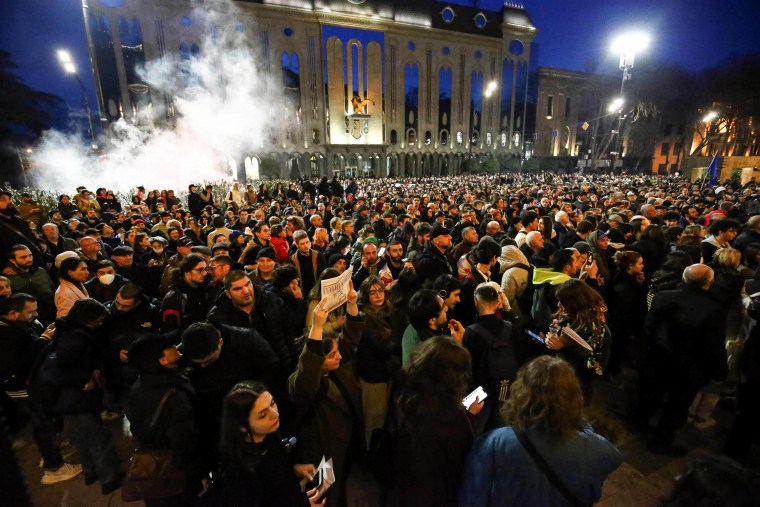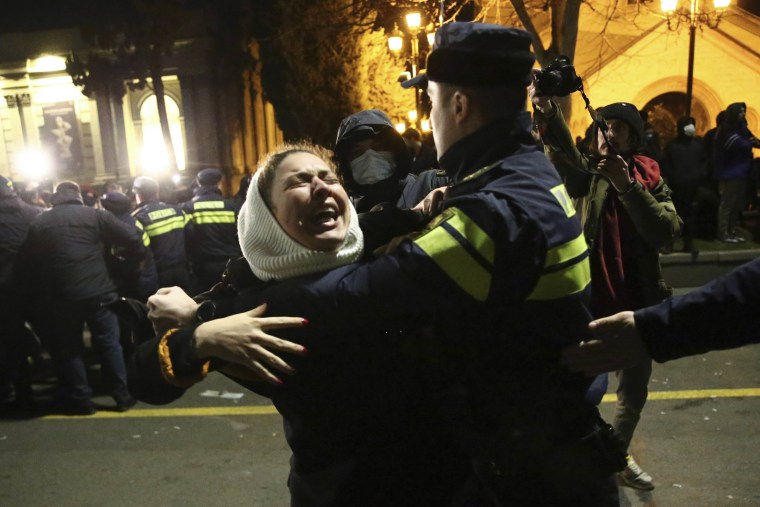TBILISI, Georgia — Police in the ex-Soviet state of Georgia used tear gas and stun grenades early on Wednesday to break up a protest outside Parliament against a draft law on “foreign agents.”
Reuters witnesses in the capital, Tbilisi, saw police with riot shields making arrests along Rustaveli Avenue, the main thoroughfare running through the center of the city.
Hours earlier police had clashed with demonstrators, some of whom threw petrol bombs and stones. The crowd then gathered outside Parliament, where some people pulled aside light metal barriers intended to keep the public away from the building.
In a statement, the interior ministry said people on both sides had been injured in what it called an extremely violent protest. Police would react to violations of the law, it added.
The ministry said 66 people had been detained over the hours-long clashes.

The protests erupted after legislators gave initial backing to the law, which critics say represents an authoritarian shift and could hurt the country’s bid to join the European Union.
Speaking in Berlin earlier on Tuesday, Georgian Prime Minister Giorgi Garibashvili reaffirmed his support for the law, saying the proposed provisions on foreign agents met “European and global standards”.
But European Union foreign policy chief Josep Borrell said the draft law was a “very bad development” for the country and could seriously affect its ties with the E.U.
Thousands of people, some waving E.U. and Ukrainian flags, stood outside Parliament and listened as speakers denounced the law, which would require any organizations receiving more than 20% of their funding from abroad to register as “foreign agents” or face substantial fines.
Critics say it is reminiscent of a 2012 law in Russia that has since been used to crack down on dissent.
President Salome Zourabichvili, who has said she will veto the law it if crosses her desk, said she was on the side of the protesters.
“You represent a free Georgia, a Georgia which sees its future in the West, and won’t let anyone to take this future away,” she said in an address recorded in the United States, where she is on an official visit.

Late on Tuesday night protesters angrily remonstrated with police armed with riot shields who then used tear gas and water cannon. At least three petrol bombs, as well as stones, were thrown at police.
Some shouted “No to the Russian law” and “You are Russian” at politicians inside the legislature.
Russia is viewed as an enemy by many Georgians, after Moscow backed separatists in the breakaway Georgian regions of Abkhazia and South Ossetia in the 1990s.
State Department spokesman Ned Price said the United States was deeply concerned and troubled about a law that “would strike at some of the very rights that are central to the aspirations of the people of Georgia”.
Georgia’s opposition parties called for fresh protests on Wednesday, which is a public holiday in Georgia to mark International Women’s Day, with crowds expected to gather outside the parliament from 3 p.m. (6 a.m. E.T).